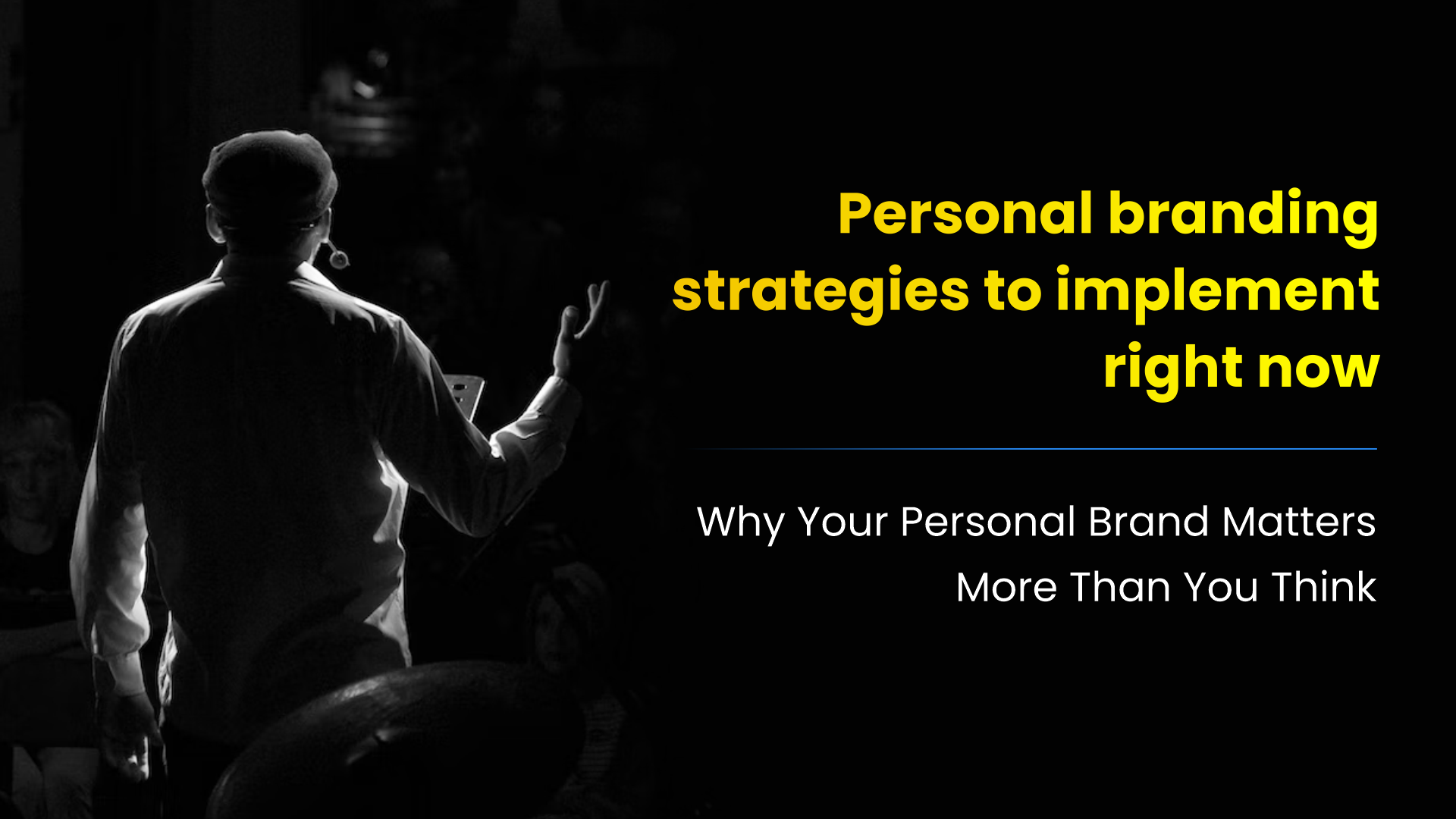Personal branding strategies to implement right now
In today’s competitive business environment, personal branding has become a necessity for senior management professionals and successful business owners. Personal branding strategies is the process of developing a distinct professional identity that sets you apart from your peers and showcases your unique skills and expertise. This is important to establish credibility, attract new clients and better job opportunities. This blog will discuss some strategies for building a strong personal brand.
What is Personal Branding?
Personal branding is establishing a unique brand image for an individual. It is the art of marketing oneself as a brand, highlighting their strengths, and differentiating themselves from competitors. Personal branding involves defining who you are, what you stand for, and what you offer that others don’t.

Why Personal Branding is gaining importance?
Personal branding is essential for professionals and business owners for various reasons:
-
- A strong personal brand helps individuals stand out from the competition. It helps create a lasting impression on clients, colleagues, and employers.
-
- A strong personal brand can help increase an individual’s credibility and influence in their industry.
-
- A strong personal brand can help individuals attract new opportunities, including new clients, speaking engagements, and media coverage.
Many successful business leaders have used a personal branding agency to achieve their goals. One such example is Elon Musk, the CEO of Tesla and SpaceX. Musk’s personal brand is based on his vision for a better future and his ability to turn his ideas into reality. His brand has helped him attract investors and talent to his companies and has helped him become a thought leader in his industry.

Let’s look at some Effective Personal Branding Strategies:
Develop a Strong Online Presence
We live in a digital age, and a strong and strategic online presence for your personal brand cannot be debated. This involves creating and maintaining a professional website to showcase your skills, expertise, and achievements and provide relevant information about your industry. , A LinkedIn profile and other social media accounts are crucial. Your LinkedIn profile should be professionally set up with a professional photograph, a summary of your skills and experience, and recommendations from colleagues and clients. Depending on your objectives I suggest you must use social media platforms like Facebook, Twitter and Instagram to showcase your expertise and interact with your audience.
Example: A business coach could create a YouTube channel to share valuable insights and tips on entrepreneurship, leadership, and personal development. This helps to establish themselves as an expert in their field and build a following of potential clients.

Network and Build Relationships
Smart Networking has forever been the most effective way to grow a business and has an important role in building an effective personal brand. This involves attending industry events, conferences, and seminars and connecting with like-minded professionals. Building strong relationships will help you establish credibility, gain referrals, and even land new opportunities. You can also join professional organizations or online communities to expand your network and engage with other professionals in your industry.
Example: A marketing professional could attend a local Chamber of Commerce meeting and introduce themselves to other business owners. They could also join a professional organization like the American Marketing Association to connect with other marketers and stay up-to-date on industry trends.

Create Valuable Content
Creating valuable content is another effective way to build your personal brand. You can share your knowledge and expertise through your website blog posts, articles on online sites or on social platforms like LinkedIn, offer whitepapers, start a podcast, and post videos on youtube, Instagram, Vimeo etc. By providing valuable insights and information, you can establish yourself as an authority in your industry and build a loyal following who will help with the marketing of your personal brand. Make sure your content is relevant, engaging, and informative, and promote it on your social media channels to reach a wider audience.
Example: An HR consultant could write a blog post on the importance of company culture and share it on LinkedIn. They could also create a podcast to interview industry experts on employee engagement and retention.
Showcase Your Expertise
Showcasing your expertise is another key element of personal branding. This involves demonstrating your skills and knowledge through speaking engagements, guest appearances, and media interviews. By sharing your expertise you build your reputation and establish yourself as a thought leader. You can also publish articles in industry publications or contribute to online forums to share your insights and opinions.
Example: A financial advisor could speak at a local college about financial planning for young adults. They could also contribute articles to a personal finance blog or appear as a guest on a financial podcast.
Practice Consistency and Authenticity
Finally, practising consistency and authenticity is crucial for building a strong personal brand. This means maintaining a consistent image across your online and offline channels and being true to yourself and your values. Your personal brand should be a reflection of who you are and what you stand for. By practising consistency and authenticity, you can build trust and establish a loyal following of clients and customers.

Let’s take a look at some real-life examples of successful personal branding:
Gary Vaynerchuk is a serial entrepreneur, author, and internet personality. He’s best known for his digital marketing and social media work and has built a large following on platforms like YouTube, Instagram, and Twitter. Vaynerchuk’s personal brand is built around his expertise in marketing and entrepreneurship and his energetic and motivational personality which has helped many digital marketing consultant to device strong strategies.
Oprah Winfrey is a globally popular media executive, actress, and philanthropist. Her personal brand is built around her authenticity, empathy, and commitment to social causes. Winfrey has used her personal brand to build a media empire, including a television network and a popular book club.
Neil Patel is a pretty well-known name in our digital marketing industry. His personal brand is built around his expertise in search engine optimization and content marketing and his energetic and engaging personality. Patel has built a successful career as a consultant and speaker and founded several successful companies.
A simple comparison of personal branding vs product branding should clear it for you.
| Aspect | Personal Branding | Product Branding |
|---|---|---|
| Focus | Promoting an individual’s unique qualities | Promoting a product’s features and benefits |
| Reach | Usually limited to an individual’s network | Can potentially reach a larger audience |
| Reputation | Based on an individual’s character and expertise | Based on the quality and performance of a product |
| Longevity | Can last throughout an individual’s career | Can be affected by changes in the market or competition |
| Flexibility | Can evolve and adapt to an individual’s interests or career goals | Can be restricted by a product’s niche or target market |
| Emotional appeal | Can create a personal connection with followers | Can evoke emotional responses through branding and marketing efforts |
| Cost | Can be inexpensive or free to establish and maintain | Can require significant investment in branding and marketing |





